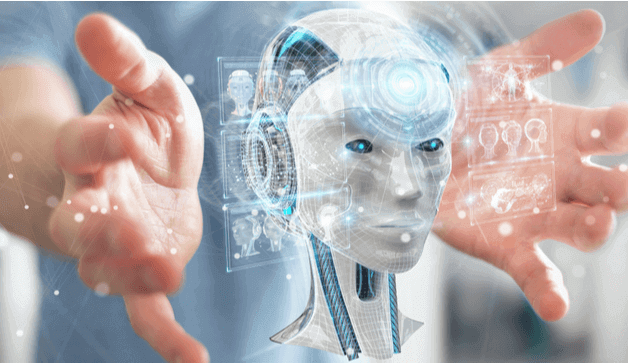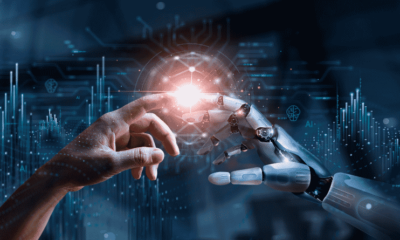
The impact of artificial intelligence in business, according to Accenture, has the potential to increase productivity by 40 percent or more. With the World Economic Forum statistics on the impact of AI by 2022, over 75 million human jobs will have been replaced by AI, at the same time, creating 133 million jobs, refuting the misconception that the adoption of AI will leave more people jobless.
What is Artificial Intelligence (AI) In Business?
With the increasingly vast amount of data available today and the constantly evolving preferences and complexity of customers, businesses can no longer rely on traditional business methods to drive growth. These radical changes have opened up new realm of possibilities, with AI, to drive business growth through actionable insights generated from customer data.
Artificial intelligence in business simply involves the use of intelligent computer software with human-like capabilities to boost revenue, improve customer experience, increase productivity and efficiency, and drive business growth and transformation.
Why should companies use AI?
Business processes in the 21st century is characterized by a high level of complexity involving tasks that are stressful and inefficient to be carried out by humans. Business in today’s world is dominated by the era of data. Companies can obtain valuable insights on strategies that can radically drive growth from data.
Hence, the need for businesses to uniquely understand the needs and preferences of customers is invaluable in today’s business world; to thrive and maintain relevance within the fierce competition. Using artificial intelligence in business, companies can now uniquely understand and engage customers, automate business processes and improve productivity and revenue while reducing operational expenses.
Examples of artificial intelligence in business
The current era of data has stimulated the rise of many applications of artificial intelligence in business including data analytics, personalized business offerings and automation.
Here are a few examples of artificial intelligence in business:
-
AI in customer service
The replacement of humans with AI in customer service is another controversial example of artificial intelligence in business. With the advent of chat-bots, customers can now interact with companies in real-time to resolve complaints, place orders, get information and do almost anything they would require from having a conversation with a human customer-care representative.
According to Gartner, 85% of customer interactions will be managed without a human by 2020. This disruptive innovation of artificial intelligence in business will alleviate the need for humans in customer interaction, reducing business costs and exponentially improving customer care accessibility and conversational experience.
-
Business Intelligence
With the increasing amount of available business data, finding insights from the data can be quite challenging. This has driven the routine adoption of artificial intelligence in business intelligence to obtain valuable insights from data.
These insights help companies improve the effectiveness of marketing, understand customers better, perform segmentation to create personalized experiences, and develop business strategies to aid corporate decision making and leverage artificial intelligence in business management.
There are quite a number of tools today that involve the use of artificial intelligence in business intelligence. Popular tools include Microsoft Power BI that helps companies get key analytics to know which strategies and decisions have great influence on business metrics. Additionally, the integration of Machine learning capabilities within Power BI can help businesses create machine learning models to make valuable forecasts and predictions from data and automate business processes.
-
Personalized and Targeted Marketing
The key to growing company revenue requires knowing the wants of a consumer and knowing what to market to each consumer. In our world of increasing digital engagement, customers have extremely limited time with too many companies trying to market their products to them. This accounts for the rising need to market only what attracts each customer and knowing who to market each of a company’s product too.
With data obtained from the online activities of customers, companies can now use AI to predict and target who to market a particular product to in order to increase the chances of sales and effectiveness of marketing activities at the same time, reducing the overall marketing cost.
-
Product recommendation and predictive analytics
To increase the effectiveness of marketing efforts and the engagement of customers with a company’s product, companies need to be able to recommend products that will retain the interest of their customers and satisfy the desires of a customer. Companies like Netflix, Spotify, Amazon, etc., now use AI to understand the habits/behaviours of customers to predict which product to recommend.
Spotify, for example, monitors and understands the listening behaviour and song preferences of users and uses AI to provide song recommendations that each user may likely enjoy. Other companies like Netflix make use of AI recommendation systems to keep users entertained and addicted to their product by providing movie recommendations that appeals uniquely to each user, based on their distinct experiences.
Approximately 75 percent of what users watch on Netflix come through these recommendations and the company’s AI recommendation reduces expenses by about $1 billion each year. Banks and Fintech companies also use AI for predictive analytics, in fraud detection and in determining customers that are likely to repay loans before approving loan requests.
-
Natural Language Processing
If you’re one of those asking, “when will machines be able to read, write and understand languages like humans?” Well, the answer is NOW! With advancements in natural language processing, companies now offer smart digital assistant products to assist users in routine tasks.
Companies now use AI to generate automated business reports without human supervision and also carry out sentiment analysis to understand people’s perception of their brand from various online comments, tweets, etc., about the company.
Through sentiment analysis, companies can constantly understand the perception of people on their products and services. This helps to improve the quality of services and personalized product offerings.
Benefits of artificial intelligence in business
The benefits businesses stand to gain from the use of AI is endless and includes:
- Automation of processes
- More positive results from marketing activities and increased revenue
- Better understanding of customers and improved experience of services offered
- Fraud detection
- Improved and more reliable customer service
Challenges
The application of artificial intelligence in business is constantly increasing. However, this growth is threatened by some critical factors that limit the use of AI technologies in business.
-
Data Scarcity
Even with the abundance of data available to companies today, the adoption of artificial intelligence in some respects remains challenging. For Machine learning, which powers most of the applications of artificial intelligence in business, to work, large amounts of data are required to train the model.
This limits the use of AI in fresh areas in business where there isn’t data available. The huge amount of data we have are most times largely unstructured and unlabeled and with most AI applications including supervised training on labelled data, this poses a measure of challenge to the use of artificial intelligence in business.
-
Algorithm Bias
Recently, Microsoft and Amazon suspended the sale of their AI face recognition software to law enforcement agencies because of the ethnic, racial and gender biases of the software. This illustrates a major challenge of AI, depicting how bad the algorithm can function when trained on biased data. In the future, such biases will be properly addressed by AI systems but for now, it poses a major threat to the adoption of AI in some areas of application.
Other challenges include:
- Limitations in current computing capability
- Issues of threats to data security and privacy (since the use of AI involves the collection of sensitive information of people).
(Also Read: Latest Developments in the Field of Artificial Intelligence)
Businesses That Have Transformed Operations With AI
Most of the top companies in the world have radically adopted the use of AI. Here are some of the top companies leveraging on the power of AI.
- Alibaba: with its integration of AI in its business operations, Alibaba uses AI to predict products customers may want to purchase and to also automatically create product descriptions
- Uber: yet another major company transforming the world of business with AI is the ride-hailing giant, Uber. Uber leverages AI to predict demand, thereby reducing estimated time of arrival and efficiently matching riders and drivers, reducing church rate. With Uber’s AI one-click chat feature, drivers can communicate with riders with a single click via automatic response recommendations to the rider’s messages.
Other great companies that have transformed business operations with AI include:
- Amazon, with their AI recommendation, automated factories and the Amazon Alexa digital assistant
- Tesla with their autonomous vehicles
- Microsoft with power BI and the Azure machine learning platform
Future AI trends
Looking into the exciting future trends of AI, in the close future, we should be expecting:
- AI generated songs and movies by entertainment companies
- Fully automated factories requiring no human supervision
- The use of AI to generate quality training data for itself, to address the issue of bias and data scarcity, and many more.
The future potentials of AI, for the first time, will leave humans with the actual power of designing the future exactly the way we want.
Final Thoughts
“Artificial intelligence would be the ultimate version of Google. The ultimate search engine that would understand everything on the web,” Larry Page asserts. “It would understand exactly what you wanted, and it would give you the right thing. We’re nowhere near doing that now. However, we can get incrementally closer to that, and that is basically what we work on.”
We’re just scratching the surface of AI and its possibilities can only exponentially increase. Companies that do not want to miss out on the revolutionary future of business, must, inevitably, embrace the use of AI as a guiding light.



